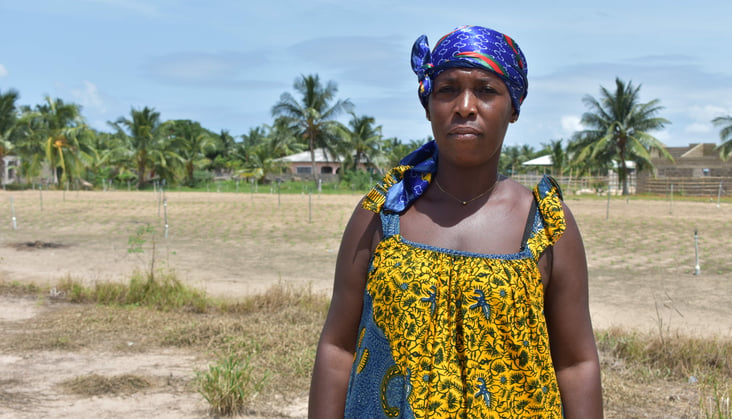By Chinasaokwu Helen Okoro
Pulitzer CentreVicentia Ayee Ayorkor looks concerned as she examines a handful of carrots she pulled out of the ground. They’re too small. She is afraid they won’t sell well at the market, but she’s got a field full of them, so she keeps harvesting the scrawny vegetables by hand, the Ghanaian sun beating on her back.Ayorkor knows exactly what the problem is. “The salt is disturbing the farm,” says the 40-year-old smallholder farmer. Her family’s land has been inundated with saline water.
In high concentrations, salinity prevents crops from growing or considerably reduces their yield, as with Ayorkor’s carrots.She is one of thousands of farmers losing crops and income to soil salinity in the Volta Delta region on Ghana’s southeast coast.
Her land is sandwiched between the Gulf of Guinea and Keta Lagoon, two saltwater bodies that infiltrate the groundwater used for irrigation from below and flood the surface during storm surges that are increasing in frequency because of climate change.No agriculture extension officers.
Although researchers and some government officials have been calling for more action to address rising salinity and its ruinous effects for years, farmers in this area who spoke to The Africa Report say they’ve had no help, and local agriculture officials note that their hands are tied by lack of support from central government.“Nobody even cares about what we are doing. Not agriculture [extension] officers,” says Angela Avetey, a neighbour of Ayorkor’s and fellow farmer, referring to the local district officials who support farmers directly.
“Nobody comes, so we always teach ourselves. You experience something, you tell your neighbour, your farm colleague, [that] this is what is happening. We need help.”Ghana unlikely to achieve food self-sufficiency target in 2024.
Agriculture director Godwin Tettey in Keta Municipal District, where Ayorkor and Avetey live, does not dispute that growers aren’t getting support. “We are understaffed,” Tettey says, adding that he only has four extension officers, each supposed to liaise with more than 3,000 farmers.
It’s one of a litany of problems. Tettey says that as of September, his office has not received its budget allocation for 2024 from the food and agriculture ministry, and he sometimes covers his staff salaries out of his pocket.Saline-saturated environmentNeither the ministry, nor the Keta Municipal Assembly, which Tettey says usually distributes that money, responded to a request for comment.
Other ministry decisions, he says, have been just as counterproductive. In 2017 and 2018, the ministry sent him seeds to distribute without first surveying farmers’ needs in the saline-saturated environment.They are still sitting in his warehouse because they weren’t salt-tolerant varieties.
“The farmers refused to take it because they say it doesn’t do well,” Tettey says, adding that he asked the ministry for seeds designed to withstand the salt, “but believe me, those things never came”.The district office also lacks the technical knowledge it needs to combat salinity. “We don’t have the expertise,” Tettey says. “We are not trained in that regard, so if some organisation comes and wants to collaborate, we are ready.
”There have been successful collaborations in other countries, providing a replicable model that could work here. In Bangladesh, agriculture officials have partnered with NGOs that specialise in saline agriculture supported by foreign aid to successfully train thousands of smallholder farmers to grow food even through bouts of extreme salinity.
Posted on October 7, 2024 08:20Ghanaian farmer Angela Avetey stands near a field of okra sprouts. The plants have germinated, but yellowed leaves are tell-tale signs of salt stress. (Rachel Parsons)Ghanaian farmer Angela Avetey stands near a field of okra sprouts. The plants have germinated, but yellowed leaves are tell-tale signs of salt stress. (Rachel Parsons)Salt water is killing crops.
In the runup to COP, The Africa Report looks at how it is affecting farmers in Africa – in conjunction with the Pulitzer CentreVicentia Ayee Ayorkor looks concerned as she examines a handful of carrots she pulled out of the ground. They’re too small. She is afraid they won’t sell well at the market, but she’s got a field full of them, so she keeps harvesting the scrawny vegetables by hand, the Ghanaian sun beating on her back.


